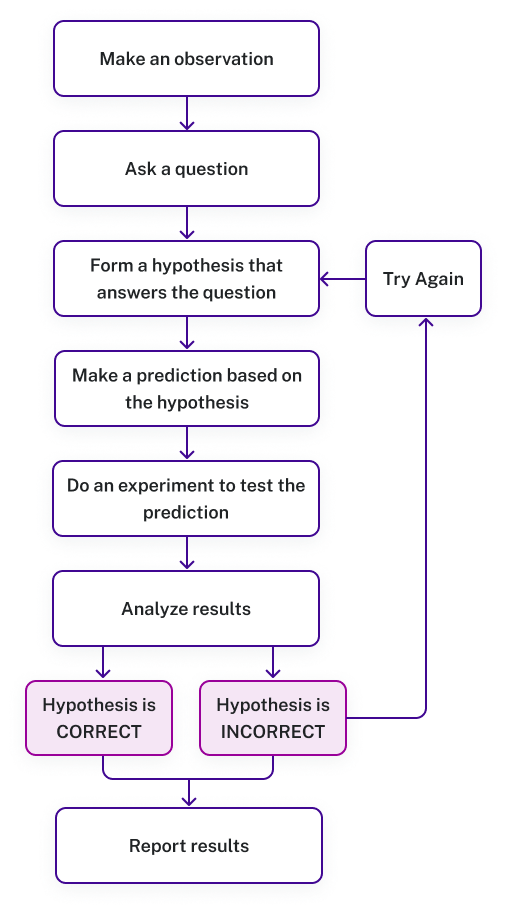- Explain the steps of the scientific method
- Define theory and hypothesis
- Discuss research ethics

Psychology relies on the scientific method to study behavior and mental processes. In contrast to other methods that people use to understand the behavior of others, such as intuition or personal experience, the hallmark of scientific research is that there is evidence to support a claim.
Scientific knowledge is empirical: it is grounded in objective, tangible evidence that can be observed time and time again, regardless of who is observing.
Process of Scientific Research
The scientific method involves taking ideas (in the form of theories and hypotheses) and testing those against the real world (in the form of empirical observations).
In order to ask an important question that may improve our understanding of the world, a researcher must first observe natural occurrences. By making observations, a researcher can define a useful question.
After finding a question to answer, the researcher can then make a prediction (a hypothesis) about what they think the answer will be. This prediction is usually a statement about the relationship between two or more variables.
After making a hypothesis, the researcher will then design an experiment to test their hypothesis and evaluate the data gathered. These data will either support or refute the hypothesis.
Based on the conclusions drawn from the data, the researcher will then find more evidence to support the hypothesis, look for counter-evidence to further strengthen the hypothesis, revise the hypothesis and create a new experiment, or continue to incorporate the information gathered to answer the research question.
The Scientific Method
The basic steps in the scientific method are:
- Observe a natural phenomenon.
- Ask a question.
- Make a hypothesis.
- Design a study and collect data to test your hypothesis (this could be done using a variety of methods, such as a survey or experiment).
- Analyze the data. If the hypothesis is true, find more evidence or find counter-evidence. If the hypothesis is false, create a new hypothesis or try again.
- Draw conclusions and repeat—the scientific method is never-ending, and no result is ever considered perfect.
Does Caffeine Enhance Memory?
Testing the Hypothesis
Imagine a researcher investigating whether caffeine enhances memory. Previous research suggests this might be true, so she designs an experiment. She randomly assigns participants to drink either caffeinated or herbal tea, then has them study a word list before completing a memory test.
There are three possible results:
- The caffeine group performs better (supports the hypothesis)
- The herbal tea group performs better (evidence against the hypothesis)
- No performance difference (also evidence against the hypothesis)

Let’s look at how the researcher should interpret each of these three possibilities.
Interpreting Support for the Hypothesis
If the caffeine group performs better, this supports the hypothesis—caffeine appears associated with improved memory. However, this doesn’t prove causation. Important questions remain: How long does the effect last? Does it work equally across all ages? Is there a difference between regular caffeine users and non-users?
Because of these uncertainties, scientists avoid saying a study “proves” a hypothesis. Instead, they say results offer evidence in support of the hypothesis.
Interpreting Evidence Against the Hypothesis
If the herbal tea group demonstrates better memory, this contradicts the researcher’s expectations. She must acknowledge that her evidence doesn’t support the hypothesis. However, she shouldn’t overextend this interpretation—finding better memory in the no-caffeine group wouldn’t prove that caffeine harms memory.
Since earlier studies suggested caffeine helps memory, this single study doesn’t invalidate all previous research. Perhaps those studies examined different age groups or participants with varying baseline caffeine intake. This new study simply adds one piece to the larger puzzle of caffeine-memory research.
When Results Show No Difference
If results show no difference between groups, the researcher again must admit she hasn’t found support for her hypothesis. In fact, some recent studies have found that caffeine’s effects vary by task type—for example, a 2025 study found that post-encoding caffeine actually reduced accuracy in face recognition memory, while it had enhanced object recognition in earlier studies.[1] This highlights how scientific understanding evolves as evidence accumulates from multiple studies using different methods and measuring different outcomes.
Why the Scientific Method Is Important for Psychology
The scientific method allows psychological data to be replicated and confirmed in many instances, under different circumstances, and by a variety of researchers. Through replication of experiments, new generations of psychologists can reduce errors and broaden the applicability of theories. It also allows theories to be tested and validated instead of simply being conjectures that could never be verified or falsified. All of this allows psychologists to gain a stronger understanding of how the human mind works.
- Leon, C.S., Lo Celso, A.L., Guajardo, R.A. et al. Caffeine reduces accuracy in face recognition memory consolidation. Sci Rep 15, 25722 (2025). https://doi.org/10.1038/s41598-025-11737-w ↵